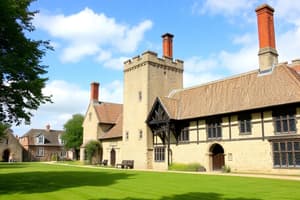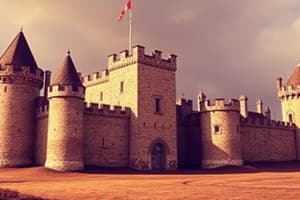Podcast
Questions and Answers
What is the primary purpose of the Domesday Book?
What is the primary purpose of the Domesday Book?
- To document local oral traditions
- To provide a historical narrative of the Norman Conquest
- To legally prove ownership of land and tax obligations (correct)
- To serve as a full population census of late 11th-century England
How many pages does the Domesday Book contain?
How many pages does the Domesday Book contain?
- 500 pages
- 913 pages (correct)
- 1,000 pages
- 1,913 pages
Which King ordered the creation of the Domesday Book?
Which King ordered the creation of the Domesday Book?
- King Richard I
- King Henry II
- King William II
- King William I (correct)
What does the nickname 'Domesday' Book refer to?
What does the nickname 'Domesday' Book refer to?
What did historians caution about the information in the Domesday Book?
What did historians caution about the information in the Domesday Book?
What was the Domesday Book based on?
What was the Domesday Book based on?
What significant role did the Domesday Book play for local historians?
What significant role did the Domesday Book play for local historians?
What aspect of the Domesday Book is highlighted by its comparison to other records in Europe?
What aspect of the Domesday Book is highlighted by its comparison to other records in Europe?
Which king named Harold Godwineson as his successor on his deathbed?
Which king named Harold Godwineson as his successor on his deathbed?
What were the three key concepts of feudalism?
What were the three key concepts of feudalism?
What was a vassal's primary obligation in the feudal system?
What was a vassal's primary obligation in the feudal system?
What role did mounted soldiers play in the emergence of feudalism?
What role did mounted soldiers play in the emergence of feudalism?
Which historian theorized that feudalism was a pre-capitalist society?
Which historian theorized that feudalism was a pre-capitalist society?
What did Marc Bloch argue about the role of peasants in feudalism?
What did Marc Bloch argue about the role of peasants in feudalism?
How did feudalism contribute to political stability in the Middle Ages?
How did feudalism contribute to political stability in the Middle Ages?
What typically characterized the peasant's life under feudalism?
What typically characterized the peasant's life under feudalism?
What was a fief in the context of feudalism?
What was a fief in the context of feudalism?
Which characteristic describes the feudal societies of the Middle Ages?
Which characteristic describes the feudal societies of the Middle Ages?
Flashcards
Who was Edward the Confessor?
Who was Edward the Confessor?
The last king of the Anglo-Saxon royal line, who died in 1066.
Who was William the Conqueror?
Who was William the Conqueror?
William, Duke of Normandy, who claimed the English throne after Edward the Confessor's death.
What is Feudalism?
What is Feudalism?
A complex system of social and economic relationships based on land ownership and military service.
Who is a Lord?
Who is a Lord?
Signup and view all the flashcards
Who is a Vassal?
Who is a Vassal?
Signup and view all the flashcards
What is a Fief?
What is a Fief?
Signup and view all the flashcards
What are the obligations of a vassal?
What are the obligations of a vassal?
Signup and view all the flashcards
How did feudalism emerge?
How did feudalism emerge?
Signup and view all the flashcards
What is the Marxist view of Feudalism?
What is the Marxist view of Feudalism?
Signup and view all the flashcards
What is the alternative view of Feudalism?
What is the alternative view of Feudalism?
Signup and view all the flashcards
What is the Domesday Book?
What is the Domesday Book?
Signup and view all the flashcards
Why was the Domesday Book created?
Why was the Domesday Book created?
Signup and view all the flashcards
What kind of information is contained in the Domesday Book?
What kind of information is contained in the Domesday Book?
Signup and view all the flashcards
What is the legal significance of the Domesday Book?
What is the legal significance of the Domesday Book?
Signup and view all the flashcards
How is the Domesday Book used today?
How is the Domesday Book used today?
Signup and view all the flashcards
Why is the Domesday Book called "Domesday"?
Why is the Domesday Book called "Domesday"?
Signup and view all the flashcards
What impact did the Domesday Book have on record-keeping?
What impact did the Domesday Book have on record-keeping?
Signup and view all the flashcards
What is the overall significance of the Domesday Book?
What is the overall significance of the Domesday Book?
Signup and view all the flashcards
Study Notes
Domesday Book
- Compiled in 1085-1086, it's England's earliest public record and a foundational document for the National Archives.
- Still legally valid in land title disputes.
- Detailed the landholdings and resources of 11th-century England, showcasing the growing government's need for information.
- Unparalleled in contemporary Europe in scope, not matched until 19th-century censuses.
- Focuses mainly on landowners, not a full population count.
- Remains a crucial primary source for local historians.
- Multiple printed versions readily available.
- Subject to scholarly textual analysis, necessitating a nuanced approach to its interpretations.
- Records over 13,000 places in England and parts of Wales, detailed on 913 pages and 2 million Latin words.
- Nicknamed "Domesday" after Judgment Day for its comprehensive assessments.
- Official custodians renamed from Public Record Office to National Archives.
- Proclaimed the written record's supreme authority over local traditions.
Genesis of the Domesday Book
- Prepared on orders from William the Conqueror.
- Part of the aftermath of the Norman Conquest, a major shift in English history, following Edward the Confessor's death.
- Edward, prior to his death, had appointed, or appeared to appoint multiple people to succession, complicated Edward's position as he had different political alliances.
- Harold Godwinson was named successor, despite an earlier oath Harold had taken concerning William's claim.
- Tostig (Harold's brother) and Harald Hardrada also had aspirations for the throne.
- William's invasion and victory marked a significant change in English politics.
Feudalism
- A system of reciprocal obligations between lords, vassals, and land (fiefs).
- Lords: landowning nobles.
- Vassals: those granted use of the land.
- Fiefs: the land itself.
- Vassals, in return for the lord’s protection, delivered services (military or otherwise)
- Feudalism emerged mainly because it allowed for a decentralized form of support for the military in the absence of a strongly centralized bureaucracy in earlier empires like the Carolingian empire.
- Characterized many Medieval societies, including England, France, Italy, Germany, the Holy Roman Empire, and Portugal.
- Systems varied, leading to unique forms specific to geography.
- Evolved in intricate ways, developing complex systems of obligations and inheritance.
- Modern interpretations often critique the system, such as Karl Marx's view that it was exploitative to the peasantry, focusing upon unequal distribution of power and the peasantry’s limited freedom, while the more nuanced interpretation by Marc Bloch highlights that peasants had some benefits despite limitations on their freedom.
Studying That Suits You
Use AI to generate personalized quizzes and flashcards to suit your learning preferences.




